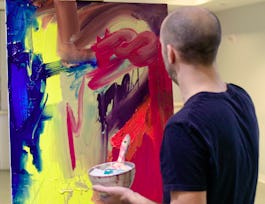- Explore
- Arts and Humanities
- Music and Art
Music and Art
Earn Your Degree
Most Popular Courses
Get Started with Photography
Top Rated Courses
Creative Writing
Virtual Museum Tour
UI/UX Design Principles and Practices
Frequently Asked Questions about Music and Art
Music is one of the oldest and most fundamental forms of human culture, but for something so universal it can be surprisingly hard to define. The first definition of music in the Merriam Webster Dictionary is "the science or art of ordering tones or sounds in succession, in combination, and in temporal relationships to produce a composition having unity and continuity."
If you think that sounds like an incredibly wordy and theoretical way to define music, you're right. But this roundabout definition is necessary. Music is perhaps the most abstract of the arts. After all, what's the difference between songs of humans and the songs of birds, or the cacophonous sounds of a busy city?
Indeed, while we might think of qualities like rhythm, melody, and harmony as intrinsic to music, they are not always as straightforward to define as they seem in classical and popular music. Certain forms of non-Western and traditional music may use elements such as melody or rhythm in ways that are unfamiliar to our ears, to the point of seeming completely absent. And in recent decades, musique concrète (or “concrete music,” which uses sounds drawn from field recordings), avant garde, ambient, and other types of experimental music have similarly pushed -- or, in some cases, erased -- the boundaries of what is considered music and what is simply sound.
Perhaps the secondary definition from Merriam-Webster is the simplest and broadest: music is "an agreeable sound." Learning how and why humans find certain sounds "agreeable" in different cultures and different historical periods can reveal profound truths about who we are, in unique ways that transcend the written word.
You don't have to be a virtuoso concert pianist to work in the music industry. Having a deep familiarity with the world of music, and a knowledge of what sounds are "agreeable" for a given audience, can be a springboard to a number of rewarding careers.
If you have serious opinions about your favorite (or least favorite) albums, you might want to consider becoming a music critic, or a music journalist to tell the stories "behind the music." If the live music experience is your passion, you can become a booking agent who connects artists with the right performance opportunities, or an event planner who works with venues to put on memorable shows.
On the other hand, if you're more technically-minded, there are a number of jobs that allow you to work directly with recorded sound. Sound engineers, for example, manage the technical aspects of a recording studio, and are responsible for ensuring that musicians sound "right" on an album. Mixing and mastering engineers take those recordings and transform them into finished albums ready for pressing onto vinyl, CDs, or directly to digital platforms like Spotify.
Online courses are an increasingly popular way to develop your expertise in music. The flexible schedule and affordability of online courses offer particular advantages to working musicians looking to build their skills while also practicing their craft. As the world's leading online education platform, Coursera offers music courses from leading institutions such as Berklee College of Music, the University of Edinburgh, and Yale University, so you can learn online without sacrificing quality.
Coursera also offers an incredible breadth of courses to fit your needs, regardless of what specific part of the industry you want to work in.
If you're interested in the latest digital tools for music-making, you can take courses in music production and music technology to get the skills you need to work in a modern studio. If you want to build skills for analyzing and writing about music, you can study music theory and the history of music. If you want to support the careers of great artists as a booking agent, promoter, or the owner of a record label, you can take courses in the music business to get the acumen you need to be successful.
Learning about the history and appreciation of music and art usually requires nothing more than an interest and passion for these forms of artistic expression. If you want to learn new skills to launch a career that focuses on music, it could be beneficial to have prior training reading music and playing an instrument, creative writing experience, or business management experience, depending on the role you want to pursue. For a career in visual arts, artistic talent and computer skills can provide a solid foundation as you embark on your studies.
Individuals who are creative and imaginative often do well in careers related to music and art. Talented musicians, painters, sculptors, and designers typically possess a desire to create something that makes a powerful statement. Those with a talent for creative writing could use their talent to launch songwriting careers or focus their skills on writing successful advertising slogans and materials. For those interested in the business side of music or art, excellent leadership and management skills are key components for success.
Interesting topics related to music and art include music theory, classical music, contemporary art, creative writing, photography, and graphic design. Special technology-based design topics include user experience design, which focuses on creating products that deliver the best user experience, and user interface design, which focuses on visual style and appeal as well as the functionality of computer applications. You could also learn to play an instrument like the guitar, analyze modern American poetry, or learn how to make your own comic book.
With a background in art, you could possibly work for design firms in a number of industries, including fashion, jewelry, furniture, interior decorating, and floral arranging. Advertising companies rely heavily on graphic artists to create the visual appeal they need to capture consumers' attention. Both internet and print publishers hire photographers and illustrators to provide appealing imagery for their publications. Music production companies work with musicians and singers but also need audio production experts to perfect final audio cuts behind the scenes. If you also have strong business and people skills, music management companies could be a career option for you. Additionally, school districts, colleges, and arts organizations hire music and art teachers to run their programs.
Online Music and Art courses offer a convenient and flexible way to enhance your knowledge or learn new Music and Art skills. Choose from a wide range of Music and Art courses offered by top universities and industry leaders tailored to various skill levels.
When looking to enhance your workforce's skills in Music and Art, it's crucial to select a course that aligns with their current abilities and learning objectives. Our Skills Dashboard is an invaluable tool for identifying skill gaps and choosing the most appropriate course for effective upskilling. For a comprehensive understanding of how our courses can benefit your employees, explore the enterprise solutions we offer. Discover more about our tailored programs at Coursera for Business here.











































































